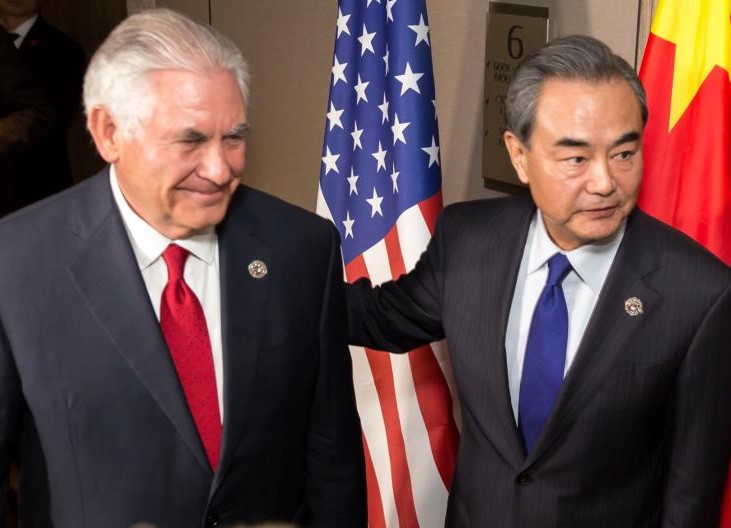
Reuters reports that China's foreign minister said on Sunday new U.N. Security Council sanctions on North Korea were the right response to a series of missile tests, but dialogue was vital to resolve a complex and sensitive issue, now at a "critical juncture".Wang Yi, in what he described as "very thorough" bilateral talks on Sunday with North Korean Foreign Minister Ri Yong Ho at a regional meeting in Manila, said he had advised him to calmly assess the U.N. resolutions and not carry out nuclear tests that would only stoke tensions. The U.N. Security Council on Saturday unanimously imposed the new sanctions on Pyongyang over its two July intercontinental ballistic missile tests, a move that could slash North Korea's $3 billion annual export revenue by a third.Wang said diplomatic and peaceful means were now necessary to avoid tensions and an escalation of the crisis."We call on all sides to take a responsible attitude when making judgements and taking actions," Wang told reporters."We cannot do one and neglect the other. Sanctions are needed but sanctions are not the final goal," Wang said.
Wall Street Journal reports that Southeast Asian nations agreed with China on Sunday to endorse a framework for a maritime code of conduct that would govern behavior in disputed waters of the South China Sea, a small step forward in a negotiation that has lasted well over a decade. Though not the long-discussed code itself, the framework sets out parameters for discussion of an agreement intended to bring predictability to a potential flashpoint as China increasingly asserts its military presence over the area in the face of rival claims. The 10 countries of the Association of Southeast Asian Nations will meet with China at the end of August to discuss legalities for negotiations on the code of conduct, with formal talks beginning soon after, Philippines department of foreign affairs spokesman Robespierre Bolivar said Sunday. The endorsement of the framework, which was tentatively agreed to in May, came during a bilateral meeting between China and Asean on the sidelines of a series of security-oriented meetings that will conclude Tuesday. The unsticking of the framework after years of obstruction is widely seen as a concession by China, which has opposed any legally binding code on maritime engagement, stepped up naval patrols and built artificial islands to enforce its claims, equipping them with military weapons.
- 2017-08-04 With live-fire drill, China warns India not to test Beijing
- 2017-08-03 China welcomes U.S. seeking dialogue with North Korea
- 2017-08-02 Trump Administration Is Said to Open Broad Inquiry Into China’s Trade Practices
- 2017-08-01 China Takes Tough Line on Sovereignty Amid Territorial Spats With Neighbors
- 2017-07-31 Trump plan on China may come as soon as this week
- 2017-07-30 China Shows Off Military Might as Xi Jinping Tries to Cement Power
- 2017-07-28 Value of U.S. deals in China sinks on rising trade tensions
- 2017-07-27 U.S. Pacific Fleet commander: I'd launch nuclear strike against China if Trump ordered it
- 2017-07-26 US and China report progress on new North Korea sanctions
- 2017-07-25 China fires back at US accusations over aerial encounter
- The Telegraph China urges North Korea to end missile tests as US praises fresh economic sanctions
- Reuters China media stress limits to North Korea sanctions, slam US 'arrogance'
- Reuters ASEAN overcomes communique impasse, urges non-militarisation in South China Sea
- Financial Times Himalayan impasse highlights China-India tensions
- Financial Times Chinese investor closes in on Oscar-winning production group
- Financial Times China's Tencent takes digital 'red packets' to India
- New York Times As Short Sellers Target Chinese Companies in Hong Kong, Hostility Mounts
- Reuters SAIC General Motors recalls 6451 GL8 minivans in China
- New York Times Weaning Itself From Elephant Ivory, China Turns to Mammoths
- Fox News Chinese official fired for not fighting extremism
- The Washington Post Chinese tourists detained for giving Nazi salute in Berlin
- Financial Times US should tread carefully on China trade concerns
- Bloomberg Xi's Move to Punish North Korea Buys Time With Trump on Trade
- The Washington Post India wanted a friend in Trump. Instead, it's getting chaos.
